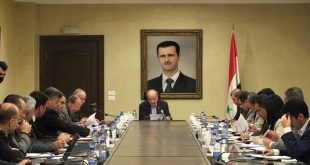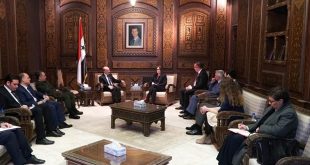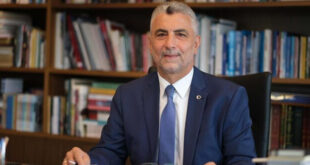Damascus, SANA – The National Film Organization on Friday held the first official premiere of “Rad al-Qada’a: Aleppo Central Prison Siege” feature film at the Opera House in Damascus.
“Rad al-Qada’a” (which can be roughly translated to “warding off fate”) is directed by Najdat Ismail Anzour, written by Diana Kamal-Eddin, and produced by Qaterji group.
The two-hour film tells the epic real-life story of Aleppo Central Prison which was besieged by terrorist organizations for an entire year before the Syrian Arab Army managed to break the siege, with the film depicting in a chronological sequence the events that transpired since the beginning of the siege until its end, featuring real characters from these events.
The film focuses on the near-daily battles between the security forces tasked with protecting the prison and the terrorist who were attempting to storm it, which run parallel to the story of a mother who asks for the hand of a young woman for marriage to her son who is besieged in the prison, with the mother waging her own battle to lift her son’s morale.
Attending the premiere, Interior Minister Mohammad al-Sha’ar said in a speech that steadfastness in the face of challenges and ordeals is the path to victory, asserting that the events that took place in Aleppo Central Prison inspire pride and dignity, with this story of bravery and daring adding another chapter to Syria’s national legacy.
In a similar speech, Culture Minister Mohammad al-Ahmad said the film is part of the Ministry’s project to confront regressive, obscurantist, Takfiri mentalities, affirming that director Anzour has made a major and effective film based on real events, despite the difficulty of summing months of real-time events and memories in just two hours.
Meanwhile, Anzour explained the title of the film in his speech, saying that terrorists thought that they could be an “inescapable fate” but the Syrians and their leader and army managed to “ward off that fate” with their determination.
The premiere was attended by ministers, People’s Assembly members, and a number of social, religious, artistic, and economic figures.
The film’s cast includes Juliette Awwad, Abdelrahman Abu-el-Qassem, Fadwa Mohsen, Fayez Qazaq, Iskandar Aziz, Sana’a Sawwah, Majd Fedda, Amer Ali, Nasser Marqabi, Amjad al-Hasan, Mazen Abbas, Marwan Abu-Shahin, Mohammad Shamma, Kinan al-Ashoush, Laith al-Mofti, Raed Moshref, Jihad al-Zoghbi, Abdullah Sheikh Khamis, and Dina Khankan.
Hazem Sabbagh
 Syrian Arab News Agency S A N A
Syrian Arab News Agency S A N A




